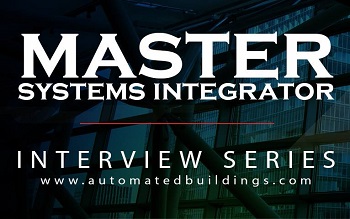 EMAIL
INTERVIEW
– Scott Cochrane and Geoff
Hunter
EMAIL
INTERVIEW
– Scott Cochrane and Geoff
Hunter|
November 2017 |
[an error occurred while processing this directive] |
| |
 EMAIL
INTERVIEW
– Scott Cochrane and Geoff
Hunter
EMAIL
INTERVIEW
– Scott Cochrane and Geoff
Hunter
Scott Cochrane is
President and CEO of Cochrane Supply &
Engineering, a leading industrial IoT and building controls
supplier
with locations throughout Michigan, Ohio, and Kentucky, as well as one
in Canada. In 2000, Scott took over the business from his father,
Donald Cochrane, Sr., who founded the company 50 years ago. He is proud
to be an advisory council member for multiple industry manufacturers
such as Honeywell, Johnson Controls, and Tridium, and to be named a
2016 IBcon Digital Impact Award Winner for his innovative contributions
to the industry.
 Geoff Hunter is President and Senior Principal of Palmer Conservation
Consulting
(PCC). Geoff was President and Founder of Coleman Systems, Inc.
prior to his acquisition and merger with Palmer Conservation Consulting
(an affiliate of Palmer Energy). Palmer Conservation Consulting
is the Midwest leading catalyst in Energy Consulting and Master Systems
Integration leveraging the power of IoT to create sustainable business
value for its clients.
Geoff Hunter is President and Senior Principal of Palmer Conservation
Consulting
(PCC). Geoff was President and Founder of Coleman Systems, Inc.
prior to his acquisition and merger with Palmer Conservation Consulting
(an affiliate of Palmer Energy). Palmer Conservation Consulting
is the Midwest leading catalyst in Energy Consulting and Master Systems
Integration leveraging the power of IoT to create sustainable business
value for its clients.
Palmer Conservation Consulting (PCC) “strategically” positions its
partners for success by minimizing their energy costs while maximizing
operational efficiencies. PCC supports governmental, educational,
commercial and industrial customers throughout Ohio, Michigan, Indiana
and Pennsylvania.

| Articles |
| Interviews |
| Releases |
| New Products |
| Reviews |
| [an error occurred while processing this directive] |
| Editorial |
| Events |
| Sponsors |
| Site Search |
| Newsletters |
| [an error occurred while processing this directive] |
| Archives |
| Past Issues |
| Home |
| Editors |
| eDucation |
| [an error occurred while processing this directive] |
| Training |
| Links |
| Software |
| Subscribe |
| [an error occurred while processing this directive] |
Scott Cochrane of
Cochrane Supply & Engineering has the unique
benefit of working with 300+ of the best systems integrators in the
country. Cochrane recognizes the critical role they have within the
building automation industry and is speaking with a different
highly-regarded MSI each month with the goal of providing examples of
industry trends, best business practices, and the growing value of an
MSI. This month, he interviews Geoff Hunter of Palmer Conservation
Consulting.
October Interview with Scott Cochrane & Brian Oswald, Managing Director for CBRE | ESI.
September
Interview with Scott
Cochrane & Joe
Napieralski the Co-Founder and Director of Development of Smart
Building Services LLC
August Interview with Scott
Cochrane &
Sidney H. Blomberg, Jr. the founder and President of K
& S Ventures, Inc
July Interview with Scott
Cochrane and Ken Sinclair
This
month,
he interviews
Geoff Hunter, President and Senior Principal of Palmer Conservation
Consulting
(PCC)
Cochrane: How did you become an MSI?
Hunter: Actually, it was customer-driven. Many of our clients had
multiple control and operating systems that struggled to share
information and were costly to support. Our clients also had difficulty
with the rising costs of maintaining and migrating proprietary
systems. The fast pace of technology and the wave of IoT
management requirements created a need for a way to connect the
building stakeholders to their systems and provide them with useful and
important information and control.
As a result, we offered an open systems approach to facilities
management that was the basis of our early success. Many of the control
vendors, engineers, and contractors resisted at the time (and some
still do). Our background as an Industrial Systems Integrator,
combined with over 150 years of HVAC design and energy management
experience, provides us the knowledge and capability to differentiate
ourselves to deliver independent third-party technical support. Our
offerings have evolved with our clients’ needs and now include
analytics, pro-active diagnostics, and IT collaboration.
Cochrane: Can you explain what some of the
characteristics are of a good MSI?
Hunter: A good MSI is driven by the needs of its Clients. A true MSI is
not in the business to sell clients a temperature control system,
mechanical or electrical equipment, mechanical maintenance services or
the like. This creates a natural conflict of interest when evaluating
opportunities and solutions. A good MSI provides its clients with
“independent third-party knowledge and technical expertise” in the
development and implementation of a common data platform/view for the
many disparate systems that exist within their building, campus or
enterprise. It should act as a technical resource and extension of the
“Owner’s Staff” in evaluating, designing, installing, coordinating,
commissioning and leveraging building technology to ensure building
systems are communicating properly, and the information is accessible
and usable to meet the client’s needs. A good MSI should have a strong
qualified technical staff trained and certified in open platforms,
operating platforms, and communication platforms, as well as mechanical
and electrical system design and operation.
Cochrane: How do you sell Master Systems
Integration services?
Hunter: We offer master systems integration services as a professional
service. For proactive clients looking to maximize their investment
dollars in new or existing facilities, it’s critical to engage MSI
services early in the construction or renovation process. Since
technology/communication has become the spinal cord of today’s
facilities management, it’s additionally critical to have the MSI on
board early as a member of the owner’s team to ensure operational and
communication technology requirements are properly evaluated,
coordinated and achieved.
Cochrane: How do your customers procure
MSI services? What’s the structure of the contract you’re in?
Hunter: Most of our support is procured through professional
services. Many clients submit RFQ’s that allow for the inspection
and evaluation of MSI firms. Some clients prefer T&M staffing
contracts that meet their procurement requirements. We have also
been successful in offering design-build contracts that focus on
delivering specified results and meeting defined budgets.
Cochrane: As an MSI, what percent of your
time is spent in the
following categories? R&D, Consultations, Field Commissioning, and
Software Programming.
Hunter:
R&D: 15% - Keeping up with technology changes can be a daunting
task. Many of our clients lean on us to guide them with regards to
technology trends and market needs. We see the good, bad and ugly and
are paid to keep our clients from making costly mistakes. Our
clients don’t expect us to get paid on their dime to learn, so being on
top of new technologies, software options and ever-changing building
codes are of critical importance.
Consultation: 40% - Our responsibility is to provide our clients with
“good” information so they can make “good” business decisions. It is in
consultation where an MSI pays for itself. Establishing trust and
technical credibility is a requirement.
Software Programming: 25% - Setup and startup is a vital role to any
successful system architecture, but we also focus on user training. Our
best clients are those who can easily access, control and operate their
systems with minimal effort. (We call it the easy button.)
Field Commissioning: 20% - This area of service has grown tremendously
in the existing building market. An MSI inspects and validates system
functionality ensuring the owner received what he paid for. This also
provides the opportunity to implement analytics and continuous
commissioning, while developing cost-effective migration paths based on
existing field conditions.
[an error occurred while processing this directive]
Cochrane: Describe a few challenges that
you’ve encountered as an MSI.
Hunter: We have learned that “open” is a relative word! For most of the
usual control and equipment manufacturers, open means one way… their
way! Claiming to be “open” requires complete transparency and owner
access to all tools and support without limitation. Our goal is
to ensure the client has competition in procuring his products and
services while ensuring flexibility for new technology offerings. There
is a lot of confusion being offered these days with regards to what
“open systems” actually means. Educating your client with accurate
information is critical to gaining trust and respect as an actual owner
advocate and solidifies the need and value of an MSI.
Cochrane: Do you envision Master Systems
Integration being a part of your business in the future? If so, how?
Hunter: It has become the fabric of who we are. Being the independent
technical experts who passionately help our clients navigate the rough
waters of building systems, operational efficiency, building technology
and the pace of IoT.
[an error occurred while processing this directive]
[Click Banner To Learn More]
[Home Page] [The Automator] [About] [Subscribe ] [Contact Us]